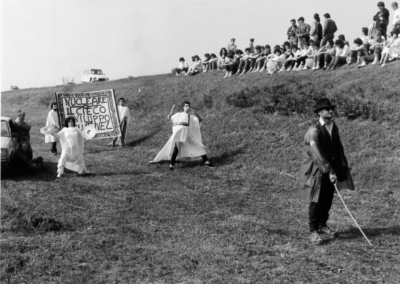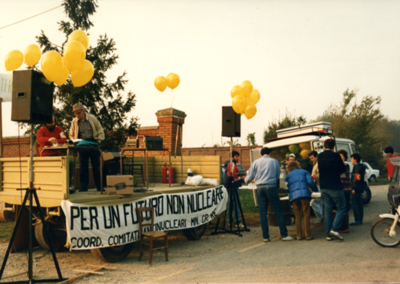Italy’s Anti-Nuclear Movement: A Grassroots Victory in Viadana
This is an excerpt from Incite-DEM’s comprehensive historical review of civic participation and engagement in Europe, the first of its kind, focusing on democratic innovations aligned with the Sustainable Development Goals. Our research focused on the development of democratic innovations from the post-World War II era to the present, highlighting key periods such as the rise of participatory budgeting and deliberative mini publics in the 1980s and 1990s.
The full research will be published in Spring 2025.
In the late 1970s to mid-1980s, a small town in Lombardy, Viadana, became a focal point for Italy’s growing anti-nuclear movement. This grassroots uprising, led by students, farmers, and local citizens, played a crucial role in shaping the future of Italy’s energy policies.
A Town United Against Nuclear Power
In 1975, Viadana, nestled in the Mantova province near the Po River, was selected as a site for a new nuclear power plant under the national Nuclear Energy Plan. The decision sparked immediate outrage among the local community. Students and environmental associations were the first to act, organizing demonstrations to raise awareness. As the movement grew, it expanded into strikes, blockades of ENEL’s (Italy’s national electricity company) operations, and acts of passive resistance.
The Birth of a Political Movement
The protests reached a critical point in 1983 when nine citizens, including members of the Viadana town council, were arrested for blocking construction. These arrests, rather than stifling the movement, galvanized it. The resulting demonstrations are widely regarded as the birth of Italy’s Green political movement, which later entered Parliament as the Federation of Green Lists.
A National Movement with Lasting Impact
The local struggle in Viadana was part of a larger national movement that gained momentum throughout the 1980s. The catastrophic Chernobyl disaster in 1986 further fueled public opposition to nuclear power in Italy. This culminated in a successful campaign leading to the 1987 referendum, where Italians voted to officially ban nuclear power.
Remembering the Struggle
In October 2023, to mark 40 years since the pivotal arrests in 1983, an anti-nuclear archive was presented, commemorating the movement’s history and impact. The event drew significant attention, especially in light of the current national government’s renewed interest in nuclear energy, highlighting the enduring relevance of the anti-nuclear movement. The story of Viadana is a powerful reminder of the strength of local activism and its potential to inspire national change. It shows how a small town, united in purpose, can influence an entire country’s energy policies.


